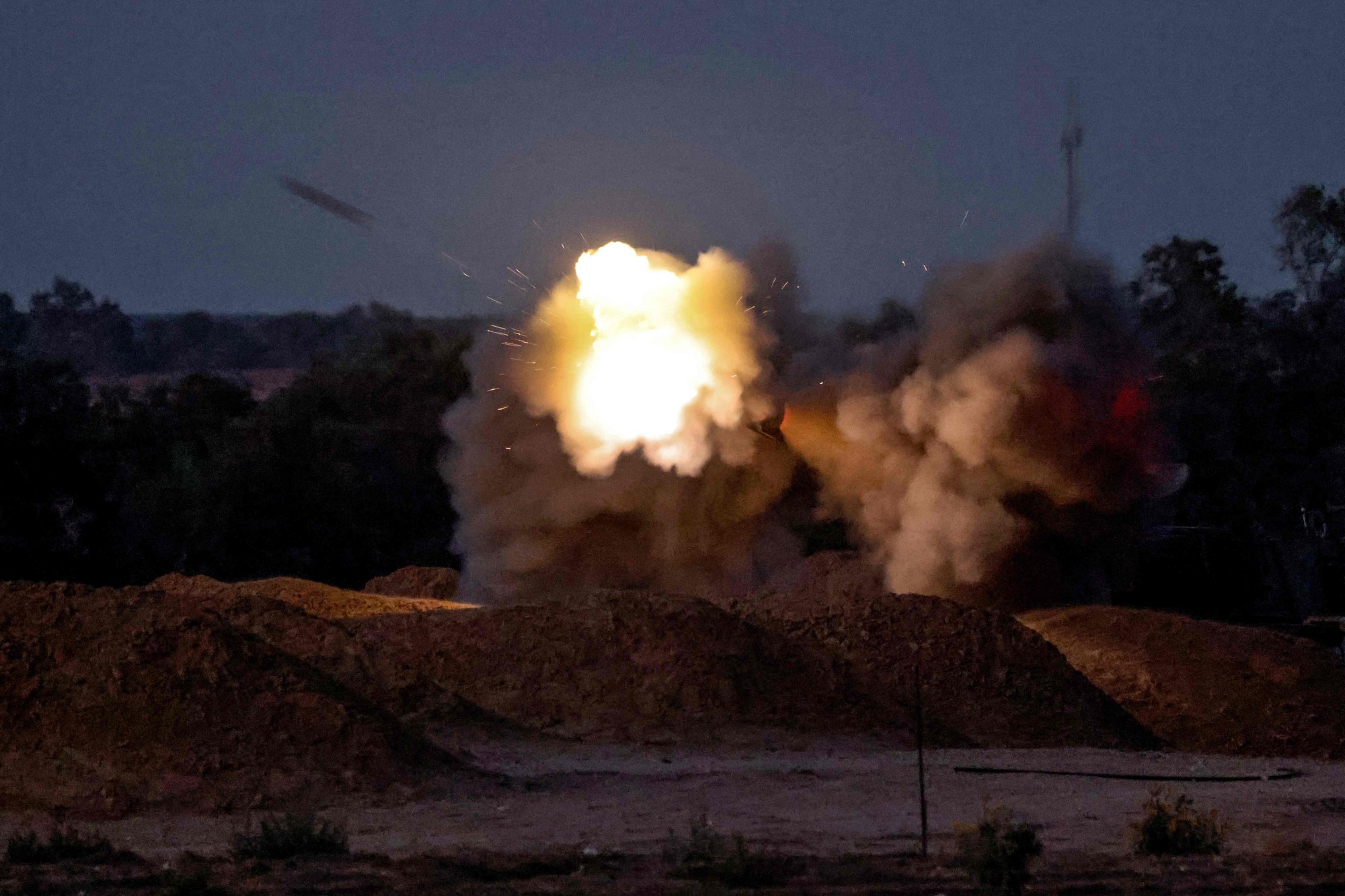
Israel strikes eastern Rafah, as Biden says US will withhold weapons if major Gaza assault proceeds, in warning to ally
- Israeli forces massed tanks close to Rafah, after US President Joe Biden vowed to withhold weapons from Israel if it launched an invasion of the southern Gaza city
- Israel appears ready to proceed with a major attack on Rafah – a city packed with civilians
Israeli tanks and warplanes bombarded areas of Rafah on Thursday, Palestinian residents said, after US President Joe Biden vowed to withhold weapons from Israel if its forces launch a major invasion of the southern Gaza city
As ceasefire talks continued in Cairo, Palestinian militant groups Hamas and Islamic Jihad said their fighters struck Israeli forces on the eastern outskirts of Rafah, firing anti-tank rockets and mortars at Israeli positions.
In his starkest comments yet, Biden raised the pressure on Israel to hold back from an all-out assault on Rafah, where hundreds of thousands of Palestinians have sought refuge after fleeing combat elsewhere in Gaza.
Israeli tanks seized the Gaza side of the Rafah border crossing with Egypt on Tuesday, cutting off a vital aid route and forcing 80,000 people to flee the city this week, according to the United Nations. Israel says it must hit Rafah to defeat thousands of Hamas fighters it says are there.

“I made it clear that if they go into Rafah, … I’m not supplying the weapons,” Biden told CNN in an interview on Wednesday.
Biden acknowledged US weapons have been used by Israel to kill civilians in Gaza, where Israel has mounted a seven-month-old offensive aimed at annihilating Hamas.
The United States is by far the biggest supplier of weapons to Israel, and it accelerated deliveries after the Hamas attacks on October 7 that triggered Israel’s offensive in Gaza. Biden acknowledged that US bombs have killed Palestinian civilians in the seven-month-old offensive.
US officials have said Washington paused delivery of a shipment of 1,800 900kg (2,000-pound) bombs and 1,700 225kg (500-pound) bombs to Israel because of the risk to civilians in Gaza.
Israel’s United Nations ambassador Gilad Erdan said on Thursday the US decision to pause some weapons deliveries to Israel will significantly impair the country’s ability to neutralise Hamas’ power, according to Israeli public radio.
But Defence Minister Yoav Gallant told Israel’s “enemies and friends” it would do whatever necessary achieve its war aims in Gaza, underlining the scale of the stand-off.
Israel kept up tank and aerial strikes across the Gaza Strip on Thursday. Tanks advanced in the Zeitoun neighbourhood of Gaza City in the north, forcing hundreds of families to flee, residents said. The Israeli military said it was securing Zeitoun, starting with a series of intelligence-based aerial strikes on around 25 “terror targets”.
Residents in the east of Rafah, the only major urban area in Gaza not yet invaded by Israeli ground forces, reported the sound of explosions in battles between Palestinian fighters and approaching Israeli troops.
Deir Al-Balah in central Gaza was heaving with thousands of people who had fled Rafah in recent days. Palestinian doctors said two people, including a woman, were killed when a drone fired a missile at a group of people there.

Ceasefire talks
In Cairo, delegations from Hamas, Israel, the US, Egypt and Qatar have been meeting since Tuesday.
CIA Director William Burns had returned from Jerusalem, where he met with Israeli Prime Minister Benjamin Netanyahu, to the Egyptian capital and resumed meetings on Thursday with mediators trying to secure a ceasefire, two Egyptian security sources said.
Citing a source familiar with the matter, Egypt’s state-affiliated Al Qahera TV said early on Thursday that areas of disagreement were being resolved and there were signs a deal would be reached, without giving details.
But Izzat El-Reshiq, a member of Hamas’ political office in Qatar, said in a statement late on Wednesday the group would not go beyond a ceasefire proposal it accepted on Monday.
That would also entail the release of some Israeli hostages in Gaza and Palestinian women and children detained in Israel.
“Israel isn’t serious about reaching an agreement and it is using the negotiation as a cover to invade Rafah and occupy the crossing,” said Reshiq.

Earlier this week, Israel declared that the three-phase truce proposal approved by Hamas was unacceptable because terms had been watered down. It did not respond immediately to the Hamas statement.
The US said on Tuesday the latest Hamas proposal could overcome an impasse in negotiations. Just a few hours before Hamas’ latest statement, Washington continued to say the two sides were not far apart.
“We believe there is a pathway to a deal … The two sides are close enough they should do what they can to get to a deal,” US national security adviser Jake Sullivan told reporters.
The war began when Hamas militants attacked Israel on Oct. 7, killing about 1,200 people and abducting 252, of whom 128 remain hostage in Gaza and 36 have been declared dead, according to the latest Israeli figures.
Israel’s assault on Gaza has killed 34,904 Palestinians, most of them civilians, the Gaza Health Ministry said.

‘Humanitarian catastrophe’ looms
The UN, Gaza residents and humanitarian groups say further Israeli incursion into Rafah will result in a humanitarian catastrophe.
A UN official said no fuel or aid had entered the Gaza Strip due to the military operation, a situation “disastrous for the humanitarian response” in the enclave, where more than half the population is suffering catastrophic hunger.
After fleeing combat further north, Palestinians have crammed into tented camps and makeshift shelters in Rafah, enduring shortages of food, water and medicine.
Since Monday, 80,000 people have fled Rafah, the UN agency for Palestinian refugees said in a post on X on Thursday.
“The toll on these families is unbearable. Nowhere is safe,” UNRWA said.

